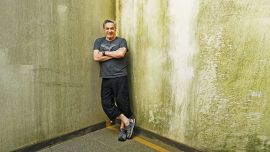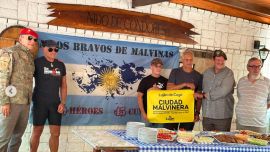They were four years old, 15 or only seven months when they were sent to Auschwitz-Birkenau, Bergen-Belsen, Buchenwald and Ravensbruck. Some were even born there.
Somehow they survived, began their lives again and had children themselves.
Now in the evening of their lives, some 40 survivors of the Nazi camps agreed to talk as the world marks the 80th anniversary of the liberation of Auschwitz-Birkenau, the most notorious of the extermination camps.
In 15 countries, from Israel to Poland, Russia to Argentina, Canada to South Africa they sat in front of our cameras to tell their stories, alone or surrounded by their children, grandchildren and great grandchildren – proof of their victory over absolute evil.
Some were speaking publicly for the first time, others have long recounted the horrors visited upon them. Many wondered what would be remembered of what happened to them when they are gone.
"I am part of the very last generation," said 86-year-old Evelyn Askolovitch, who was four when she was taken from her home in France to the camps and survived Bergen-Belsen.
"How did the world allow Auschwitz?" asked 95-year-old Marta Neuwirth from Santiago, Chile. She was 15 when she was sent from Hungary to the largest and most notorious Nazi death camp in occupied Poland.
Around one million Jews as well as Roma and members of the Polish resistance were murdered there between 1940 and its liberation by the Red Army on January 27, 1945. Most went straight to the gas chambers as soon as they arrived.
Six million Jews in total were slaughtered.
"Why?" asked Gyorgyi Nemes, who survived Ravensbruck and Flossenburg camps in Germany as well as Mauthausen in Austria.
"Even now I don't know why they hate us so much," said the 97-year-old who was born in Budapest and now lives in Canada.
No-one wanted to hear
All have had to try to make sense of life after watching their parents go to the gas chambers, their brothers and sisters die of hunger or exhaustion, or discover at the end of the war that their families had been wiped out.
Julia Wallach, who is nearly 100, has difficulty talking about what happened without crying. "It is too difficult to talk about, too hard," she said. The Parisian was dragged off a lorry destined for the gas chamber in Birkenau at the last minute.
But hard as it is to relive the horrors, she insisted she would continue to give witness. "As long as I can do it, I will do it." Beside her, her granddaughter Frankie asked, "Will they believe us when we talk about this when she is not there."
That is why Naftali Furst, a 92-year-old Israeli Auschwitz survivor born in Bratislava, has been going to Germany, Austria and the Czech Republic for years to tell his story "so the younger generations never forget what happened."
It is also why Esther Senot, 97, braved the Polish winter last month to go back to Birkenau with French high school students.
She was keeping a promise she made in 1944 to her dying sister Fanny, who – laid out on the straw coughing up blood – asked her with her last breath to "tell what happened to us... so that we are not forgotten by history.”
"We shouldn't have died for nothing," echoed 97-year-old Eva Shainblum in Montreal, who was deported to the same enormous death camp next to Auschwitz from what is today Romania when she was 16. Almost all of her family were exterminated.
What we now forgot is that for years no-one wanted to hear about the Shoah.
It took until December 7, 1970, and a remarkable act of contrition by German Chancellor Willy Brandt for survivors' stories to be listened to.
By kneeling in front of a monument to the victims of the Warsaw Ghetto Uprising and begging forgiveness for his people, he helped create a space for their suffering to be heard.
'There wasn't a scream'
The shock of their arrival in the camps, the horror of the selections, the brutality of the SS and the cold efficiency of industrial mass murder still haunt the survivors.
Many had already been traumatised by their nightmarish journey to the camps inside locked cattle trucks "like animals.”
"There were about 80 of us, women, children and old people with just a bucket. No water or even a bit of bread," said Albrecht Weinberg, 99, who still lives in Germany.
"When we arrived [at Auschwitz], prisoners in uniforms with sticks shouted 'Out! Out!' The old people fell out of the wagon – there was a heap of them on the ground – and the young came out on top of them."
The dehumanisation still marks Polish-born Canadian Nate Leipciger, now 96. In a few "minutes we were transformed from being free people to being incarcerated in a concentration camp with numbers on our arms.”
"They removed our clothing, our hair, and everything that was personal, so you became just an object, and you lost all your ability to function as a human being."
The old, the fragile and the children were sent straight to their deaths, the rest became slave labourers.
"They separated us, women and children on one side, men on the other side. It was a long platform, and at the end of it was a table with several SS soldiers," recalled 100-year-old Hungarian-born Canadian Ted Bolgar.
The soldiers "looked at you and waved you right or left. We had no idea what it meant. But we found out later.”
Marta Neuwirth, who sorted the clothes taken from inmates at Auschwitz, saw columns of naked women arriving "day and night" from convoys that "arrived from everywhere.”
"They made them throw their clothes on the ground. They weren't worried, they thought they were going to have a shower... there wasn't a scream. It was calm. They went big and healthy straight to the ovens."
'I passed out from hunger'
Bolgar's sister and mother were gassed as soon as they arrived, "then burned at night.” He and his father were sent the other way during the selection when he told them he was an electrician.
Those not killed straight away became slaves at the mercy of the SS butchers and their underlings.
"The work was so hard, the engineer.... so brutal that sometimes three people died of exhaustion in one day," said Weinberg, who was put to work burying cables under Auschwitz.
"I cannot find words to describe the ferocity and the savagery" of the kapos at Birkenau – the prisoners recruited to lord it over the other inmates – said Frenchwoman Ginette Kolinka, 99. "Move or I'll kick you. That was the kapos."
Not to mention the hunger. Pole Marek Dunin-Wasowicz, 98, who was held in the Stutthof camp, said there were "weeks when I ate nothing. I passed out from hunger.”
And then there were the medical experiments. Romanian-born American Sami Steigmann became a human guinea pig in the Mogilev-Podolsky camp near the border between today's Ukraine and Moldova.
"I'm in constant pain every single second," said the 85-year-old, who has long lived in poverty. "I used extremely powerful, addictive medication, but about 45 years ago, I decided to learn to live with the pain, but without the medication."
'I don't sleep at night'
Nor has the pain dimmed for Hirsz Litmanowicz, sent at 11 with his brother to Auschwitz-Birkenau. Later transferred to Sachsenhausen in Germany, they tested a hepatitis B vaccine on his skeletal body.
His brother died in the camps but he survived "because I was chosen for these experiments, not him. I wasn't even able to say goodbye or hold him to me," said the Polish-born Peruvian, overcome with emotion.
Now 93, and a grandfather of six and great grandfather of eight, he admitted that he "feels the pain of what I endured more now than in the past. I don't sleep at night, I have nightmares."
"I had a twin sister," said Polish-born Canadian Pinchas Gutter, 92.
They were both sent to Majdanek camp when he was 11. He was separated from Sabrina the moment they stepped into that "apocalyptic hell". "She started running towards my mother, and she hugged her... She had this beautiful blonde braid."
That beautiful braid is now the only visual memory he has of Sabrina, who was gassed with her mother.
"It is extremely hurtful to me," the old man said.
In Buenos Aires, Polish-born Petr Polacek, 88 – who was six when he was sent to the Theresienstadt (Terezin) camp in what is now the Czech Republic – holds to what his murdered father "taught me before we were deported: to face life.”
It was her mother's heroic strength which saved Prague-born Israeli Eva Erben, 84, who was also in Theresienstadt before being sent to Auschwitz. "She talked about what we would do when he went home; what we would buy, what shoes we'd have, what clothes we'd wear when we visited people, and how we would have our teeth repaired."
She died in the snow on the "death march" to Germany and Austria when the Nazis emptied the camps as the Soviet army approached.
Return of anti-Semitism
Like a lot of the remaining survivors, Nate Leipciger said that "I did not expect that it would be so important to talk about the Holocaust 80 years later but it has become so because of the terrible rise in anti-Semitism around the world."
It has been particularly resurgent since the 2023 October 7 attacks by the Islamist movement Hamas on Israel, which set off the war in Gaza that is still raging.
Leipciger sees other parallels too with the 1930s. "No-one was willing to take us in as refugees" either, he recalled, though the difference today is "we have Israel.”
Many survivors are also frightened by the rise of the far right across Europe, especially the Alternative for Germany (AfD).
"These are dark times," said Erich Richard Finsches, 97, horrified by the historic victory of the Freedom Party (FPO) in his native Austria. He believes that voters are being duped just as they were by Austrian-born Adolf Hitler in the 1930s.
The fear of the world forgetting torments many of them.
Pinchas Gutter worries that the Holocaust "will get drowned out" by the weight of history, or by the constant stream of social media, adds Eva Shainblum.
"I'm worried about the new generation because they don't have the patience to listen," she said. "They have this machine [smartphone] that they are on day and night. I see even with my grandchildren," she said.
"For decades they said we talked about it too much... but the more generations pass, the less they seem to know about what happened," worried Hungarian Judit Varga Hoffmann, 97, who survived Auschwitz.
Russian Elena Jabina, 82, who was only seven months old when she was put in the Klooga concentration camp in Estonia, fears that after the death of the last survivors "no memory of it will probably remain.”
"There is a phrase in the Talmud (the source of Jewish law and theology) that says, 'He who forgets his past is condemned to relive it'," said Catherine Chalfine.
Her father, Algerian-born Auschwitz survivor Gabriel Benichour, at 98 is no longer able to testify for himself.
Seeing her Roma culture and language fade adds to the suffering of Vienna-born Rosa Schneeberger.
"The Sinti are disappearing," the 88-year-old who was sent to the Lackenbach "gypsy" camp in Austria when she was five.
"Most died during the war" and there are not enough survivors to keep the community going, she said.
'Life is about standing up'
Despite everything they went through, the survivors hold to hope and a faith in life that sustained them through the worst a human can endure.
You can only be awed listening to Gyorgyi Nemes, who finished her interview in Montreal by saying: "I buried my husband 10 years ago, but I have a son, a daughter-in-law and my family, and I'm telling you, I'm the luckiest person in the world."
Or 103-year-old Ella Blumenthal, who lost her whole family – 23 people – in the Holocaust. She somehow survived the Warsaw ghetto, Majdanek, Auschwitz-Birkenau and Bergen-Belsen.
"It was a miracle we came out alive. We weren't gassed and I'm still here. So it's an art, I am telling you, to survive.
"I knew how and God helped me. It wasn't just me, but I was helped to survive, to stand on my feet and say what a beautiful world."
It is that absolute necessity for resilience and resistance that the survivors return to again and again as they call for peace and tolerance and an end to hate.
"To always have hope of surviving and to fight for that," said 97-year-old Argentine Raquel Lily Soriano Alhadeff.
Born on the Greek island of Rhodes, then under Italian rule, she survived Auschwitz-Birkenau, and escaped from a Dachau satellite camp just before it was liberated.
"We must pass the torch to the young," declared Marek Dunin-Wasowicz, who was in the Polish Resistance, and survived the death marches at 15 to testify 75 years later in the trial of the SS guard Bruno Dey, one of the last of its kind.
The young "are the only hope," he insisted.
Guy Poirot, one of the youngest of the survivors, agrees.
Born in Ravensbruck 46 days before its liberation, the Frenchman's very existence is a miracle. Babies born in the camps were killed straight away.
"It's for you the young to take things in hand," he said, "to listen to those who have given you a conscience.
"Work together, think together," he urged. "Life is all about standing up."
by Yannick Pasquet & AFP photographers, AFP



















Comments